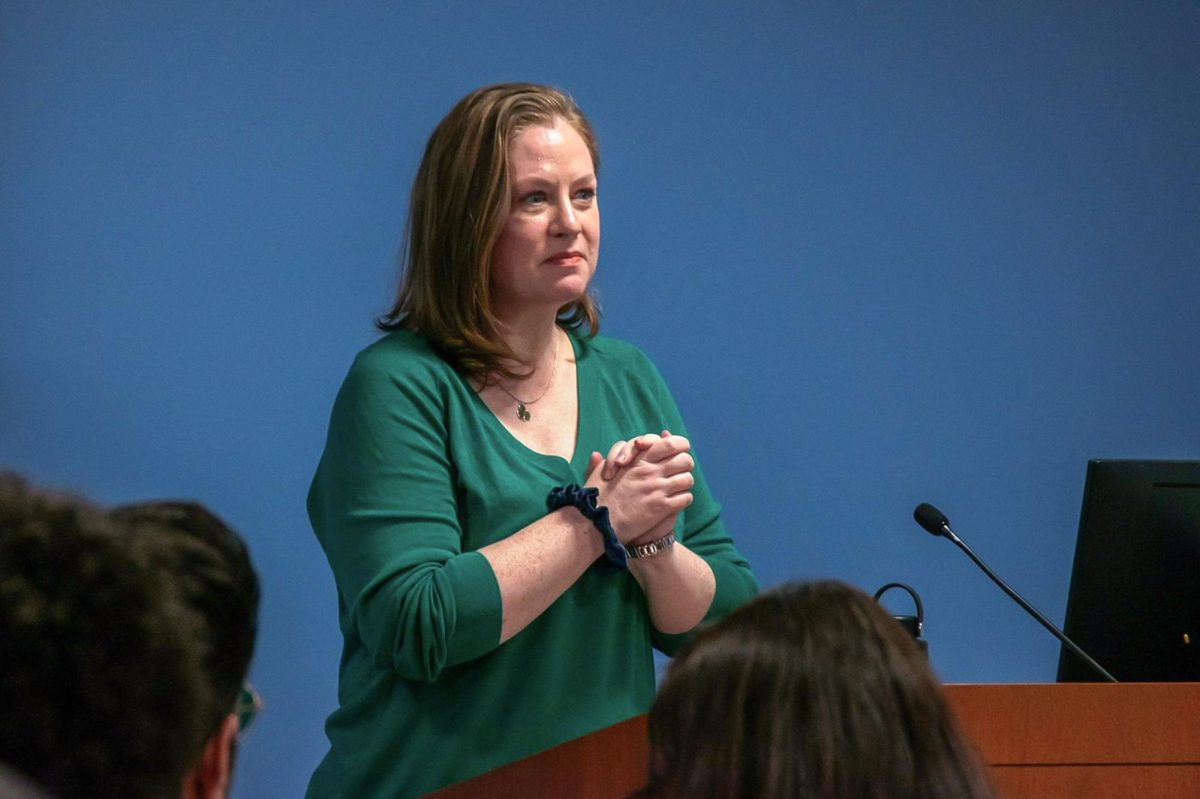More than 450 Milken Institute of Public Health students, faculty and community members signed a letter last week advocating against the Board of Trustees’ decision to arm about 20 GW Police Department officers in the fall.
The letter — dated May 4 and addressed to interim University President Mark Wrighton, incoming University President Ellen Granberg, GWPD Chief James Tate, Board of Trustees Chair Grace Speights and Board members — states that Milken community members believe the Board overlooked “relevant data” and “nuances” of gun violence and requests officials join a community forum to answer questions about the decision’s reasoning. The letter, signed by 410 students, 42 faculty and staff and 13 affiliates, including alumni, parents and local citizens, states that Milken community members know the Board’s decision will negatively impact the health, safety and well-being of the GW community.
The letter states that Milken students believe officials should meet gun violence with an “equity-centered” and “evidence-based” approach to preserve the public health of the GW community. Milken students have learned alternative approaches to combatting gun violence that avoid arming campus police as members of a “top” public health school, according to the letter.
“As students trained to make evidence-based policy decisions, we feel compelled to direct your attention to the myriad data on the adverse effects of armed police in community environments,” the letter states.
Wrighton’s announcement of the decision last month states that officials will arm GWPD officers ranking sergeant or higher with 9 mm handguns, who will be able to immediately respond to developing emergencies instead of deferring response to armed officers in other departments. Wrighton said officials made the decision after more than a year of “careful consideration” in a response to heightened gun violence in educational settings.
Milken community members’ letter states that GW already has an “immense presence” of armed police, like Metropolitan Police Department officers and Secret Service agents on and around campus. The letter states that increasing the presence of firearms in all settings results in a higher likelihood of fatal violence, and that armed guards in school settings are not associated with a decrease in injury or death during mass shootings, according to research reported in the Journal of the American Medical Association.
The letter lists questions about how officials made the arming decision following their request for a public forum like other options the Board considered, the public safety data officials used and how the University will mitigate the risk of police gun violence against community members.
The letter also asks officials to provide more information on the review board of armed officers they plan to institute and questions why officials compared GW to “market-basket” schools in their decision-making process instead of schools on “integrated urban” campuses.
“As a renowned institution of higher education, you also also have an obligation to use high-quality data and evidence – as well as to consider the will of the members of the community – when making a decision as weighty and consequential as arming our campus police officers,” the letter states.
University spokesperson Julia Metjian said University leadership acknowledges the “important perspectives” students bring to discussions about public safety and that officials will review the PHSA’s letter and recommendations. Metjian declined to say whether officials will answer questions in a public forum, if officials reviewed data similar to the research cited in the letter and how officials factored in the number of neighboring police jurisdictions to their decision.
“As part of the university’s community engagement efforts to hear feedback on implementation planning, leadership has been meeting with faculty, staff, and students and has contacted representatives of the Public Health Student Association to discuss their letter,” Metjian said.
Milken Dean Lynn Goldman said in a Wednesday email to Milken community members that public health community members must understand the decision’s risks, like a police officer mistakenly shooting a community member, and its benefits, like protection against armed criminals. She said Milken community members should be aware that people have daily experiences where they fear encounters with police will turn deadly, which causes them to face “debilitating trauma.”
Goldman said communication between all campus community members is “essential” and that the community must listen to “valid points” regarding public health research and evidence on gun violence and arming GWPD officers. The email directs Milken community members to the GWPD website to express their opinions.
“We need to engage with our campus partners to create paths forward to provide an environment where campus life can thrive in safety and harmony without creating undue burdens of fear and stress,” Goldman said in the email.
Prabha Raghavan, a graduate student studying global health and the president of the Public Health Student Association, said the Milken community is “disappointed” because officials have not revealed the experts they consulted and the public safety data they used to inform the decision to arm officers. She said officials did not consult Milken faculty and students researching gun violence solutions, which makes her “scared” the decision may harm community members.
She said a future community forum would respond to Wrighton and Tate’s previous request for community feedback on the decision. She said the forum would ensure a “two-way” discussion between community members and officials.
“We’re inviting them to participate in a community forum because it would reduce some of the barriers that we as community members are facing in accessing or understanding the reasoning behind this solution,” Raghavan said.
Kathryn Fleisher, a graduate student studying health policy who helped write the letter, said officials should “slow down” and consider different solutions to gun violence because police violence occurs more frequently than school shootings. She said arming GWPD officers is a “poor reflection” of Milken because the decision was “regressive” and that public health students have an “obligation” to engage with decision-makers.
“This is poor institutional practice and a really disappointing way to watch my institution handle such a pressing and weighty matter,” Fleisher said.











